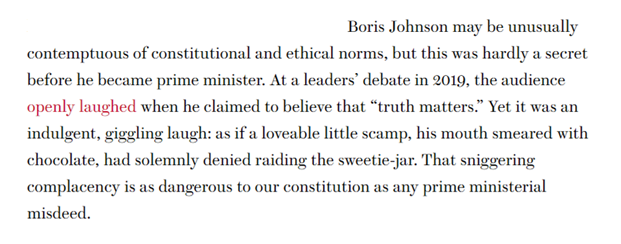
Even if you accept this view of international relations, these tweets suggest an extraordinary contempt for democratic government at home. Let's take a couple of examples. [Thread] 

"Nobody ... incl the PM thought there wd be a US deal".
But Johnson repeatedly told voters that Britain was "first in line" for "a fantastic trade deal". The 2019 manifesto promised a wave of deals "starting with the USA".
If Cummings is right, voters were misled.
But Johnson repeatedly told voters that Britain was "first in line" for "a fantastic trade deal". The 2019 manifesto promised a wave of deals "starting with the USA".
If Cummings is right, voters were misled.

"We intended to ditch bits we didn't like".
No one told British voters that. The 2019 manifesto insisted that "we have a great new deal that is ready to go", which would "get Brexit done", secure "friendly relations" with the EU and let the country "move on".
Was that not true?
No one told British voters that. The 2019 manifesto insisted that "we have a great new deal that is ready to go", which would "get Brexit done", secure "friendly relations" with the EU and let the country "move on".
Was that not true?

"I always intended an IM Bill after we won a majority".
But you didn't plan to tell the electorate that before they provided that majority?
It’s as if elections are just some obstacle to be navigated, before getting on with the serious business of government.
But you didn't plan to tell the electorate that before they provided that majority?
It’s as if elections are just some obstacle to be navigated, before getting on with the serious business of government.

The idea that "cheating foreigners is a core part of the job" is bad enough.
The idea that cheating *the electorate* is part of the job is worse.
This isn't just a grim view of diplomacy. It's a grim view of democracy.
The idea that cheating *the electorate* is part of the job is worse.
This isn't just a grim view of diplomacy. It's a grim view of democracy.

• • •
Missing some Tweet in this thread? You can try to
force a refresh









